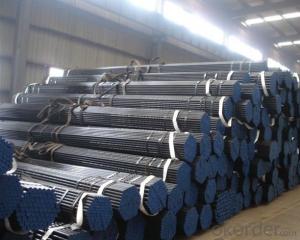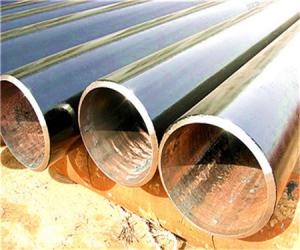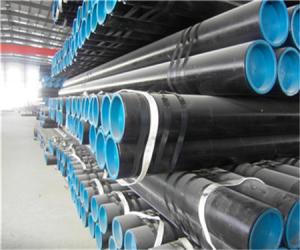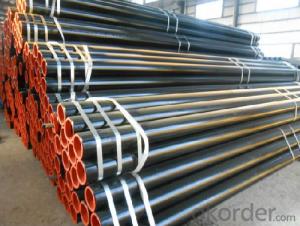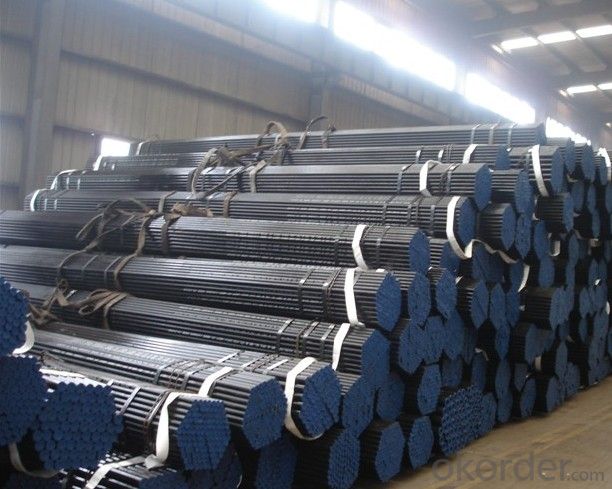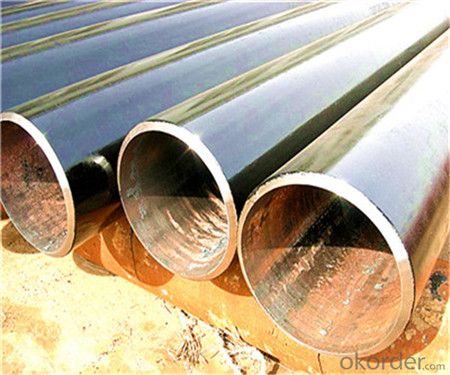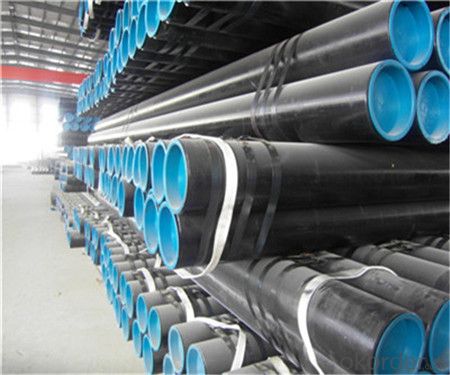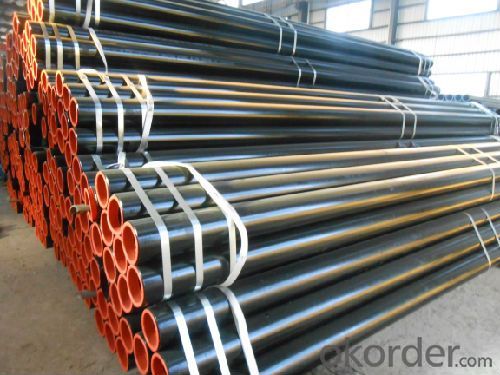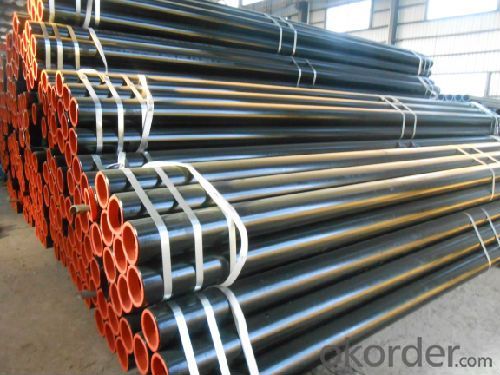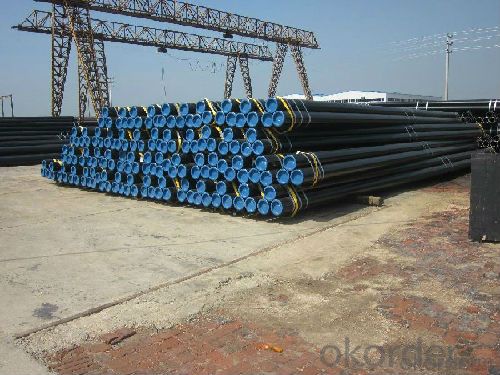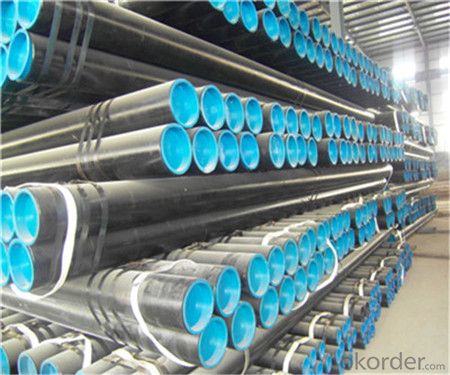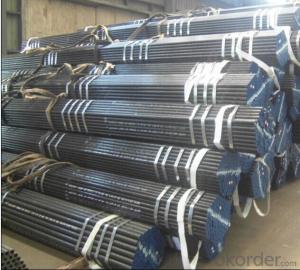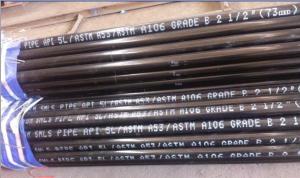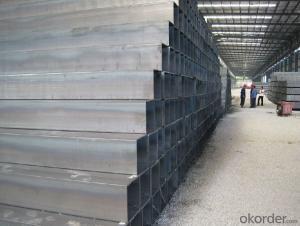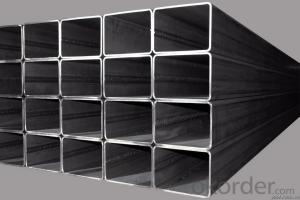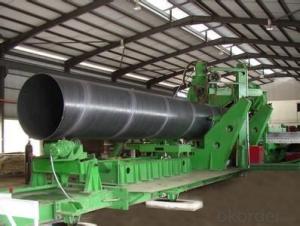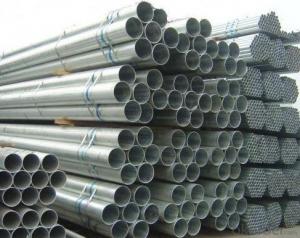Steel Line Pipe for Sour Service API 5L Supplier
- Loading Port:
- China Main Port
- Payment Terms:
- TT or LC
- Min Order Qty:
- 30 m.t.
- Supply Capability:
- 12000 m.t./month
OKorder Service Pledge
OKorder Financial Service
You Might Also Like
1、Full series of products provides an easier access for one stop purchase ▲ Line pipe ▲ Tubing and casing ▲ L & M & H boiler tube ▲ Gas cylinder tube & pipe ▲ Mechanical & Structural pipe ▲ Ship-building tube & pipe ▲ Automobile tube & pipe
2、Main Features of the Seamless Pipe ASTM A106/53: • High manufacturing accuracy • High strength • Small inertia resistance • Strong heat dissipation ability • Good visual effect • Reasonable price
3、Seamless Pipe ASTM A106/53 Specification:
4、Packaging & Delivery
5、FAQ of Seamless Pipe ASTM A106/53: Why should you chose us?
● Full series of products provides an easier access for one stop purchase ▲ Electric Resistance Welded (ERW) Steel Pipe ▲ Longitudinal Submerged Arc Welded (LSAW) Steel Pipe ▲ Spiral Submerged Arc Welded (SSAW) Steel Pipe ▲ Hollow Section (Square and Rectangle Pipe) ▲ Hot Dipped Galvanized Steel Pipe
6、Seamless Pipe ASTM A106/53 Images:
|
- Q: What are the advantages of using steel pipes in the manufacturing of storage tanks?
- There are several advantages of using steel pipes in the manufacturing of storage tanks. Firstly, steel pipes are highly durable and have a long lifespan, making them capable of withstanding high pressure and harsh environmental conditions. Secondly, steel pipes offer excellent resistance to corrosion, ensuring the integrity of the storage tank and preventing any leakage or contamination. Additionally, steel pipes are flexible and can be easily fabricated into various shapes and sizes, allowing for customization based on specific storage requirements. Lastly, steel pipes are cost-effective and readily available, making them a popular choice in the manufacturing industry.
- Q: What is the compressive strength of steel pipes?
- The compressive strength of steel pipes can vary depending on the specific grade and manufacturing process, but it is generally high. On average, steel pipes have a compressive strength ranging from 60,000 to 120,000 pounds per square inch (psi).
- Q: What is the role of steel pipe manufacturers in sustainable development?
- The role of steel pipe manufacturers in sustainable development is to promote environmental responsibility and resource efficiency throughout the production process. They play a crucial role in reducing carbon emissions by adopting cleaner technologies, optimizing energy consumption, and implementing waste management strategies. Additionally, steel pipe manufacturers can contribute to sustainable development by prioritizing the use of recycled materials, supporting recycling initiatives, and ensuring their products have a long lifespan to minimize waste generation. By embracing sustainable practices, steel pipe manufacturers can help create a more sustainable future for the construction and infrastructure industries.
- Q: Can steel pipes be used for underground air supply systems?
- Indeed, underground air supply systems can make use of steel pipes. Due to their robustness, endurance, and ability to withstand external forces like corrosion and impact, steel pipes are frequently employed in underground settings. They possess the capacity to endure the pressure and temperature prerequisites of air supply systems while also being effortlessly installed below ground. Moreover, steel pipes boast an extended lifespan, rendering them a financially prudent option for underground air supply systems. Nonetheless, when selecting the suitable steel pipes for a particular underground air supply system, it is crucial to take into account factors such as soil conditions, potential for corrosion, and local regulations.
- Q: Can steel pipes be used for offshore applications?
- Yes, steel pipes can be used for offshore applications. Steel pipes are commonly used in offshore oil and gas drilling operations, as they have high strength, durability, and resistance to corrosion, which are essential qualities for withstanding harsh marine environments. Additionally, steel pipes can be easily welded and fabricated to meet specific offshore project requirements.
- Q: What are the different types of valves used with steel pipes?
- There are several types of valves commonly used with steel pipes, including ball valves, gate valves, globe valves, check valves, and butterfly valves. These valves serve different purposes and have various designs, such as quarter-turn operation for ball valves, wedge-shaped gates for gate valves, and disc-shaped elements for butterfly valves. Each type of valve offers specific advantages and is selected based on the application requirements and the flow control needs of the steel pipe system.
- Q: Is the seamless steel pipe used in the market hot or cold drawn?
- Outside diameter 89, most are cold drawn, more than 89 hot rolling.
- Q: What is the difference between steel pipe and concrete pipe?
- Steel pipe and concrete pipe are commonly used for various applications, but they have significant differences in material composition and properties. To begin with, the primary distinction lies in the materials utilized to manufacture these pipes. Steel pipes consist of steel, an alloy of iron and carbon. Conversely, concrete pipes are composed of a mixture of cement, aggregate (such as sand or gravel), and water. Additionally, steel pipes are renowned for their strength and durability. They can withstand high pressure, making them suitable for transporting fluids or gases under high pressure. Steel pipes also possess high resistance to corrosion, which is advantageous in environments exposed to moisture or chemicals. In contrast, concrete pipes are not as sturdy as steel pipes and are more prone to cracking or damage under high pressure. Nevertheless, they can still handle moderate pressure loads and are often employed in drainage systems or sewage applications. Another noteworthy difference is the installation process. Steel pipes are typically joined together through welding techniques like butt welding or socket welding, creating a seamless and robust connection between the pipes. Conversely, concrete pipes are often installed using rubber or gasketed joints, which are simpler to assemble and disassemble. Cost is another factor where steel and concrete pipes diverge. Steel pipes tend to be more expensive due to the higher cost of steel as a raw material and the additional labor required for welding and fabrication. On the other hand, concrete pipes are generally more cost-effective as the materials used in their production are more readily available and the installation process is simpler. In summary, the main disparities between steel pipes and concrete pipes revolve around their material composition, strength, resistance to corrosion, installation process, and cost. Steel pipes offer superior strength and durability, making them suitable for high-pressure applications and environments prone to corrosion. Concrete pipes, while not as robust, are cost-effective and commonly used in drainage systems or sewage applications.
- Q: Can steel pipes be used in the automotive industry?
- Yes, steel pipes can be used in the automotive industry. Steel pipes are commonly used in the automotive industry for various applications such as exhaust systems, fuel lines, and structural components due to their high strength, durability, and resistance to corrosion.
- Q: Can stainless steel pipes spray black paint?
- Yes, after painting, I usually touch hands and paint off in 2 years or so
Send your message to us
Steel Line Pipe for Sour Service API 5L Supplier
- Loading Port:
- China Main Port
- Payment Terms:
- TT or LC
- Min Order Qty:
- 30 m.t.
- Supply Capability:
- 12000 m.t./month
OKorder Service Pledge
OKorder Financial Service
Similar products
Hot products
Hot Searches
Related keywords
